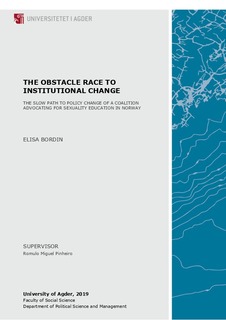| dc.description.abstract | Developing schoolsexualityeducation policies is a complex matterdue to the controversial and politicized nature of sexuality. This thesisaims at understanding the development of institutional change in the presence of complex policy systems that involvemultiple actors in the policy process. To achieve this aim, itanalyses the actionsof an advocacy coalition that works to change sexuality education policies in Norway.The study adopts the Advocacy CoalitionFramework (ACF)for understanding the interconnections among the macro-level of the political and historicalcontext, the micro-level of the actor’s motivationsand the meso-level ofcoalition’s goals and strategies. Moreover, it supports the ACF with the Historical Institutionalism (HI) approach toexplain the struggle between the actors’ effortsto achieve policy change and the persistence of cultural and political institutions.Through the conduction of interviews and the analysis of relevant policy documents, this study identified aclose interaction and co-dependence among differentelements of the political system. In implementing its strategy, the coalition encountered facilitating and hindering factors that determined the achievement of aslow incremental change. The advocacy coalition started and continuouslyinfluenced the change process through a strategy of knowledge production and sharingthat contributed inchangingattitudes and perception of policy participantson sexuality education.The active agency of the coalition’s actors in creating arenas and channels of sharing and coordination facilitated the learning process. Nonetheless, fixed institutions and conflictsof interests hindered the achievement of a major policy change.Therefore, this thesis identifiesthe policy process as a complex interaction among different factors and elements that generate reciprocal influence and jointly determine the process’ outcomes. Hence, the study concluded that the institutional setting is essential in determining rules and constraints for the actors.However,the active agency of policy participantscan strategically exploit the historicaland institutional setting for achieving the actors’ goals.Keywords: Sexuality education, Norway, advocacy coalitions, institutional change, policy-learning, historical institutionalism | nb_NO |

